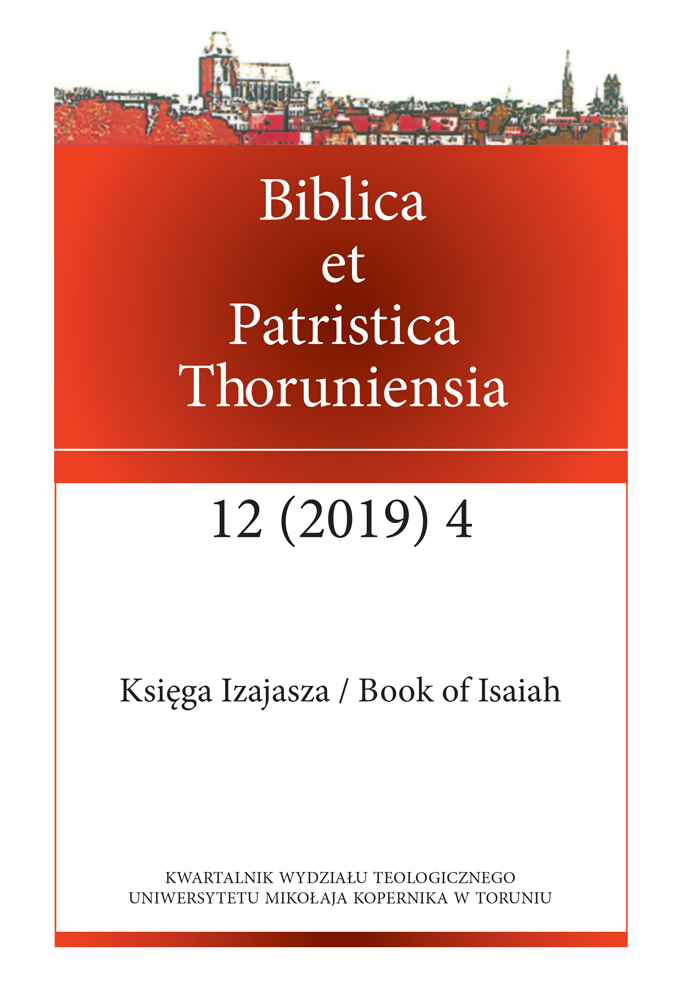The Theological Message of the Fourth Servant Song (Isa 52:13–53:12) in Light of Its Structure
DOI:
https://doi.org/10.12775/BPTH.2019.022Schlagworte
Deutero-Isaiah, Fourth Servant Song, rhetorical analysisAbstract
The article aims to analyse the structure of Isa 52:13–53:12 deploying elements of the analysis of the biblical and Semitic rhetoric developed by Roland Meynet. The article begins with an overview of earlier scholarly suggestions concerning the structure of the Fourth Servant Song, including Meynet’s. The major part of the article constitutes a rhetorical analysis of the song, first as a whole and then within its individual rhetorical units. In the final part of the article, major theological motifs of the song are presented, which are part of a new vision of suffering and death in the context of the Old Testament.
Literaturhinweise
Baltzer, K., Deutero-Jesaja (KAT 10/2), Gütersloh: Gütersloher Verlagshaus, 1999.
Barré, M.L., Textual and Rhetorical-Critical Observations on the Last Servant Song (Isaiah 52,13–53,12), CBQ 62 (2000) 1–27.
Barthélemy D., Critique textuelle de l’Ancien Testament. 2. Isaïe, Jérémie, Lamentations (OBO 50/2), Göttingen: Vandenhoeck & Ruprecht, 1986.
Berges U., Jesaja 49–54 (HThKAT), Freiburg–Basel–Wien 2015.
Blenkinsopp, J., Isaiah 40–55. A New Translation with Introduction and Commentary (AB 19), New York: Doubleday, 2000.
Bonnard, P.-E., Le Second Isaïe, son disciple et leur éditeurs. Isaïe 40–60 (Études bibliques), Paris: J. Gabalda, 1972.
Brzegowy, T., Prorocy Izraela, I, Tarnów: Biblos, 1994.
Cazelles, H., Les Poèmes du Serviteur. Leur place, leur structure, leur théologie, RSR 43 (1955) 5-51.
Ceresko, A.R., The Rhetorical Strategy of the Fourth Servant Song (Isaiah 52,13–53,12). Poetry and the Exodus-New Exodus, CBQ 56 (1994) 42–55.
Childs, B.S., Isaiah (OTL), London–Leiden: Westminster John Knox, 2001.
Conroy, C., The ‘Four Servant Poems’ in Second Isaiah in the Light of Recent Redaction-Historical Studies in Biblical and Near Eastern Essays. Studies in Honour of Kevin J. Cathcart, ed. C. McCarthy and J.F. Healey (JSOTSup 375), London: T & T Clark, 2004, 80–94.
Coppens, J., Le Messianisme et sa relève prophétique. Le anticipations propétiques, leur accomplissement en Jésus, Gembloux: Duculot, 1974.
Duhm, B., Das Buch Jesaja (HAT 3/1) Göttingen: Vandenhoeck & Ruprecht, 1892.
Freedman D.N., Lundbom J., dôr, in TDOT, III, 169–181.
Grelot, P., I canti del servo del Signore. Dalla lettura critica all’ermeneutica (Studi Biblici 9), Bologna: EDB, 1983.
Marconcini, B., Księga Izajasza (Rozumieć Stary Testament), Kraków: Wydawnictwo M, 2000.
Meynet, R., Le quatrième chant du Serviteur Is 52,13–53,12, Gregorianum 80 (1999) 407–440.
Meynet, R., Wprowadzenie do hebrajskiej retoryki biblijnej (Myśl Teologiczna 30), Kraków: WAM, 2001.
Orlinski, H.M., The so-called ‘Servant of the Lord’ and ‘Suffering Servant’ in Second Isaiah in Studies on the Second Part of the Book of Isaiah (VTSup 14), Leiden: Brill, 1977, 3-133.
Oswalt, J.N., The Book of Isaiah. Chapters 40–66 (NICOT), Grand Rapids: Eerdmans, 1998.
Orlinski, H.M., The so-called ‘Servant of the Lord’ and ‘Suffering Servant’ in Second Isaiah in Studies on the Second Part of the Book of Isaiah (VTSup 14), Leiden: Brill, 1977, 3-133.
Paściak, J., Izajasz wieszczem Chrystusa (Attende Lectioni 12), Katowice: Wydawnictwo św. Jacka, 1987.
Raabe, P.R., The Effect of Repetition in the Suffering Servant Song, JBL 103 (1984) 77–84.
Schenker, A., Knecht und Lamm Gottes (Jesaja 53). Übernahme von Schuld an Horizont der Gottesknechtslieder (SBS 190), Stuttgart: Verlag Katholisches Bibelwerk, 2001.
Snaith, N.H., Isaiah 40–66. A Study of the Teaching of the Second Isaiah and Its Consequences in Studies on the Second Part of the Book of Isaiah (VTSup 14), Leiden: Brill, 1977, 139-146.
Stachowiak, L., Księga Izajasza II–III (40–60). Wstęp – przekład z oryginału – komentarz – ekskursy (PŚST 11/2), Poznań: Pallottinum, 1996.
Westermann, C., Isaiah 40–66. A Commentary (OTL), London: SCM, 1969.
Whybray, R.N., Isaiah 40–66 (NCBC), Grand Rapids: Eerdmans, 1975, 169–170.
Downloads
Veröffentlicht
Zitationsvorschlag
Ausgabe
Rubrik
Lizenz
CC BY ND 4.0. Posiadaczem prawa autorskiego (Licencjodawcą) jest Autor, który na mocy umowy licencyjnej udziela nieodpłatnie prawa do eksploatacji dzieła na polach wskazanych w umowie.
- Licencjodawca udziela Licencjobiorcy licencji niewyłącznej na korzystanie z Utworu/przedmiotu prawa pokrewnego w następujących polach eksploatacji: a) utrwalanie Utworu/przedmiotu prawa pokrewnego; b) reprodukowanie (zwielokrotnienie) Utworu/przedmiotu prawa pokrewnego drukiem i techniką cyfrową (e-book, audiobook); c) wprowadzania do obrotu egzemplarzy zwielokrotnionego Utworu/przedmiotu prawa pokrewnego; d) wprowadzenie Utworu/przedmiotu prawa pokrewnego do pamięci komputera; e) rozpowszechnianie utworu w wersji elektronicznej w formule open access na licencji Creative Commons (CC BY-ND 3.0) poprzez platformę cyfrową Wydawnictwa Naukowego UMK oraz repozytorium UMK.
- Korzystanie przez Licencjobiorcę z utrwalonego Utworu ww. polach nie jest ograniczone czasowo ilościowo i terytorialnie.
- Licencjodawca udziela Licencjobiorcy licencji do Utworu/przedmiotu prawa pokrewnego nieodpłatnie na czas nieokreślony
PEŁEN TEKST UMOWY LICENCYJNEJ >>
Stats
Number of views and downloads: 1315
Number of citations: 0



